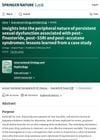Diagnostic Criteria for Enduring Sexual Dysfunction After Treatment With Antidepressants, Finasteride, and Isotretinoin
October 2021
in “
The international journal of risk and safety in medicine
”
TLDR The document sets criteria for diagnosing long-term sexual dysfunctions caused by certain medications.
The document establishes diagnostic criteria for enduring sexual dysfunctions following the use of antidepressants, finasteride, and isotretinoin, including conditions like post-SSRI sexual dysfunction (PSSD), post-finasteride syndrome (PFS), and post-retinoid sexual dysfunction (PRSD). Common symptoms are decreased genital sensation, reduced sexual desire, and erectile dysfunction. The criteria were developed from two large case series and refined by a multidisciplinary panel to improve diagnosis and research, acknowledging potential future adjustments. The document also introduces Post-SSRI asexuality, linked to early SSRI exposure, and notes that similar dysfunctions may arise from other drugs like antipsychotics and NOACs.












